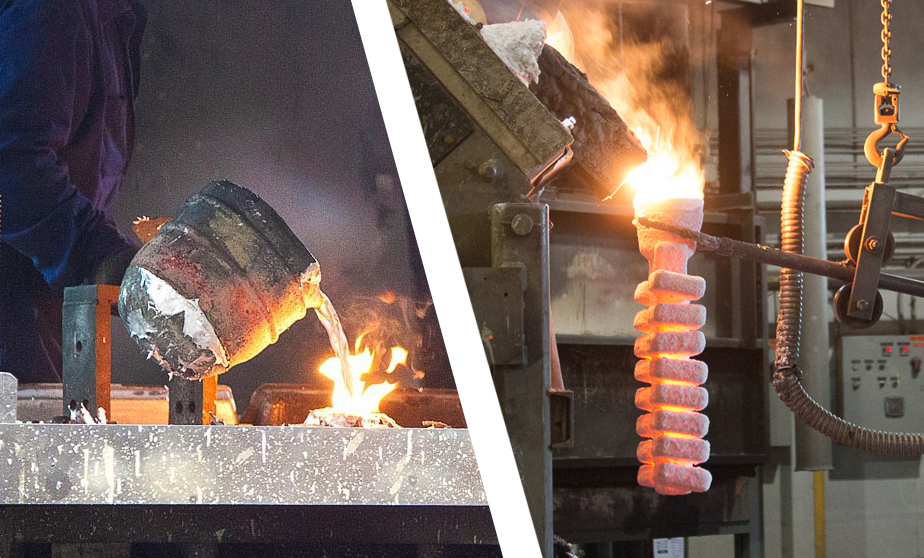Top Guidelines Of Stahl Specialty Company
Top Guidelines Of Stahl Specialty Company
Blog Article
Excitement About Stahl Specialty Company
Table of ContentsThe Single Strategy To Use For Stahl Specialty CompanyThe smart Trick of Stahl Specialty Company That Nobody is Talking AboutStahl Specialty Company Can Be Fun For EveryoneThe Single Strategy To Use For Stahl Specialty Company7 Easy Facts About Stahl Specialty Company Shown
The subtle distinction lies in the chemical material. Chemical Comparison of Cast Aluminum Alloys Silicon promotes castability by reducing the alloy's melting temperature and improving fluidness throughout spreading. It plays an important duty in allowing detailed molds to be filled accurately. In addition, silicon adds to the alloy's toughness and wear resistance, making it useful in applications where resilience is essential, such as vehicle components and engine components.It likewise boosts the machinability of the alloy, making it easier to process right into finished items. This way, iron adds to the overall workability of aluminum alloys. Copper raises electric conductivity, making it beneficial in electric applications. It also improves deterioration resistance and contributes to the alloy's general toughness.
Manganese adds to the strength of light weight aluminum alloys and improves workability. Magnesium is a lightweight component that offers stamina and effect resistance to light weight aluminum alloys.
It permits the manufacturing of light-weight parts with excellent mechanical homes. Zinc boosts the castability of light weight aluminum alloys and helps manage the solidification process during casting. It enhances the alloy's stamina and firmness. It is frequently located in applications where detailed forms and fine details are necessary, such as decorative spreadings and certain automobile parts.
Top Guidelines Of Stahl Specialty Company
Because aluminum-silicon alloys have excellent spreading residential or commercial properties, high gas properties, basic processes, and exceptional rust resistance, aluminum-silicon alloys are most frequently made use of in the die-casting industry in your home and abroad. At the very same time, aluminum-silicon alloys are also reasonably early and widely acknowledged alloys developed and made use of in die-casting. After continual study and renovation, the majority of the existing international mainstream aluminum-silicon alloys have actually been wrapped up and are nothing greater than A356, A360, A380, ADC12, B390, and A413.
The main thermal conductivity, tensile stamina, return stamina, and elongation vary. Select ideal basic materials according to the efficiency of the target product produced. Among the above alloys, A356 has the highest possible thermal conductivity, and A380 and ADC12 have the most affordable. The tensile limit is the opposite. A360 has the finest yield toughness and the highest elongation rate.

8 Simple Techniques For Stahl Specialty Company
In precision casting, 6063 is appropriate for applications where elaborate geometries and high-grade surface area finishes are paramount. Instances include telecommunication enclosures, where the alloy's exceptional formability enables smooth and cosmetically pleasing styles while keeping architectural honesty. In the Illumination Solutions sector, precision-cast 6063 components create classy and effective lights fixtures that call for intricate shapes and great thermal performance.
(https://urlscan.io/result/0195897f-20fd-7001-a6ac-ce9798aafe78/)
It leads to a finer surface area coating and far better corrosion resistance in A360. The A360 displays exceptional elongation, making it suitable for complicated and thin-walled elements. In precision spreading applications, A360 is appropriate for industries such as Customer Electronics, Telecommunication, and Power Devices. Foundry. Its boosted fluidness enables intricate, high-precision elements like smart device housings and interaction gadget housings.

In accuracy casting, aluminum 413 beams in the Customer Electronic Devices and Power Devices industries. This alloy's premium rust resistance makes it a superb selection for outside applications, ensuring durable, sturdy items in the pointed out industries.
The 9-Second Trick For Stahl Specialty Company
The light weight aluminum alloy you pick will significantly affect both the casting process and the homes of the final product. Due to the fact that of this, you should make your choice meticulously and take an educated approach.
Identifying one of the most suitable light weight aluminum alloy for your application will mean considering a vast range of qualities. These relative alloy characteristics directory adhere to the North American Pass Away Casting Organization's guidelines, and we have actually separated them into 2 classifications. aluminum foundry. The first classification addresses alloy characteristics that influence the manufacturing procedure. The 2nd covers characteristics impacting the residential properties of the final product.
The alloy you select for die casting straight impacts a number of elements of the casting process, like how simple the alloy is to collaborate with and if it is prone to casting defects. Warm breaking, likewise referred to as solidification cracking, is a regular die spreading flaw for light weight aluminum alloys that can lead to interior or surface-level splits or fractures.
Things about Stahl Specialty Company
Particular light weight aluminum alloys are much more prone to warm splitting than others, and your selection should consider this. An additional common problem discovered in the die casting of light weight aluminum is pass away soldering, which is when the cast adheres to the die wall surfaces and makes ejection difficult. It can damage both the cast and the die, so you need to look for alloys with high anti-soldering homes.
Deterioration resistance, which is currently a noteworthy attribute of aluminum, can vary significantly from alloy to alloy and is a necessary characteristic to think about relying on the environmental conditions your product will certainly be exposed to. Wear resistance is an additional home generally looked for in light weight aluminum products and can separate some alloys.
Report this page